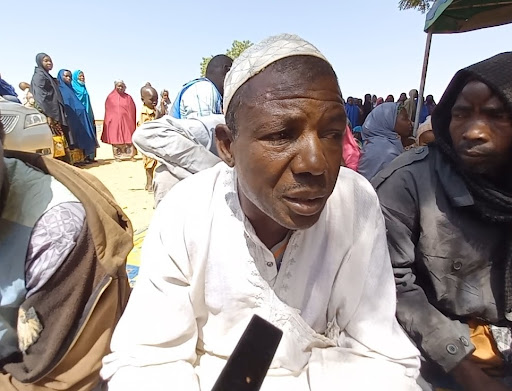‘We Still Go For Days Without Food’ – Borno IDP Laments
The lack of food has plagued Internally Displaced Persons (IDPs) in Borno state. Some IDPs say they have lost count of the number of days they go to bed without food - a situation forcing many to contemplate returning to their unsafe communities.

All that Sabo Garba, an internally displaced fish farmer from Baga in Kukawa local government of Borno state, Northeast Nigeria, wanted at the moment was to be assisted with means of transportation to enable him to move his family out of the camp and return to his ancestral home.
Baga is one of the locations in the heart of Lake Chad still considered unsafe due to the unabated hostilities of the Boko Haram terrorists.
In the past seven years, residents of the fishing communities have had to flee the remote hinterland on two occasions to settle in two different IDP camps in Maiduguri, the state capital.
Since Garba was forced to flee where he used to eke out a living as a farmer and fisherman, the 51-year-old father of eight children said he and his family have been living a miserable life as IDPs in Maiduguri.
“You don’t need to be told for you to see that life has mistreated us as IDPs in this camp; what better testimony do we have to give than the obvious fact that we have been reduced to less than beggars here in the camp.
“There is no end to the list of plights afflicting us here, but the worst of them all is when a man wakes to a day he has no remote plans of how or where he can go to get food to feed his family.
“The world should know that we are starving here in Gubio camp because it is clear that both government and humanitarian organisations have abandoned us. Yes! Or how do you explain a situation where no one gives us food or any form of support for over eight months running now.”
Garba, whose claim was being corroborated by the general nodding of heads from some of his IDP colleagues, made these revelations to a HumAngle Reporter who visited the camp on Tuesday Feb. 8.
He said one of their coping mechanisms was to allow their children to go into a nearby Housing Estate to beg residents for alms and food remnants to eat.
“Our children have no option than to go to the Low-cost housing estate to beg for alms, while our women would sometimes go to search for firewood in the bush to sell. We, the men, can no longer go to the farm in nearby bushes because many males who tried to have been attacked and killed by Boko Haram.
“We have no options other than wanting to go back to our communities even if they are not safe, rather than die here as a result of hunger. For God sake, here we lack everything, including the food to eat and even water to drink. I have eight children and two wives that live here with me in the camp. I have no control over what and how they get what they eat and I am not happy about it.”
The troubled IDP begged the Borno state government to give them support in terms of transportation “so that we can all return to Baga where maybe we can have some form of decent living as humans.”
IDPs at Gubio camp used to receive monthly food support that came in either food or cash provided by the WFP.
The Borno state government had last year warned humanitarian organisations against giving food support to all IDPs within and around Maiduguri, as doing so would slow down the government’s plan to end the Boko Haram insurgency and IDPs dependence on palliative.
According to a recent WFP report, Borno tops the three states of Northeast Nigeria, where “conflict is affecting the lives and livelihoods of millions of people, with 4.4 million people facing acute hunger.”
Support Our Journalism
There are millions of ordinary people affected by conflict in Africa whose stories are missing in the mainstream media. HumAngle is determined to tell those challenging and under-reported stories, hoping that the people impacted by these conflicts will find the safety and security they deserve.
To ensure that we continue to provide public service coverage, we have a small favour to ask you. We want you to be part of our journalistic endeavour by contributing a token to us.
Your donation will further promote a robust, free, and independent media.
Donate HereStay Closer To The Stories That Matter




